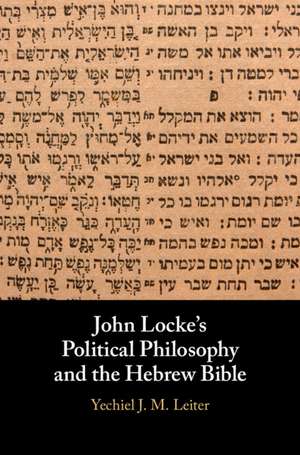John Locke's Political Philosophy and the Hebrew Bible
Autor Yechiel J. M. Leiteren Limba Engleză Hardback – 27 iun 2018
Preț: 855.95 lei
Preț vechi: 995.28 lei
-14% Nou
Puncte Express: 1284
Preț estimativ în valută:
163.84€ • 178.02$ • 137.71£
163.84€ • 178.02$ • 137.71£
Carte disponibilă
Livrare economică 31 martie-14 aprilie
Preluare comenzi: 021 569.72.76
Specificații
ISBN-13: 9781108428187
ISBN-10: 1108428185
Pagini: 430
Dimensiuni: 161 x 235 x 28 mm
Greutate: 0.72 kg
Editura: Cambridge University Press
Colecția Cambridge University Press
Locul publicării:New York, United States
ISBN-10: 1108428185
Pagini: 430
Dimensiuni: 161 x 235 x 28 mm
Greutate: 0.72 kg
Editura: Cambridge University Press
Colecția Cambridge University Press
Locul publicării:New York, United States
Cuprins
1. Retrieving the lost honor of the first treatise; 2. Locke's unusual natural law; 3. Equality and liberty: the role of imago dei vs. domineering phantom; 4. Property and charity: the biblical contours of Lockean economics; 5. On rebellion: what makes a revolution glorious?; 6. The fall and the extent of human depravity.
Notă biografică
Descriere
John Locke, whose ideas helped give birth to the United States, predicated his political theory on the Hebrew Bible. Why?
